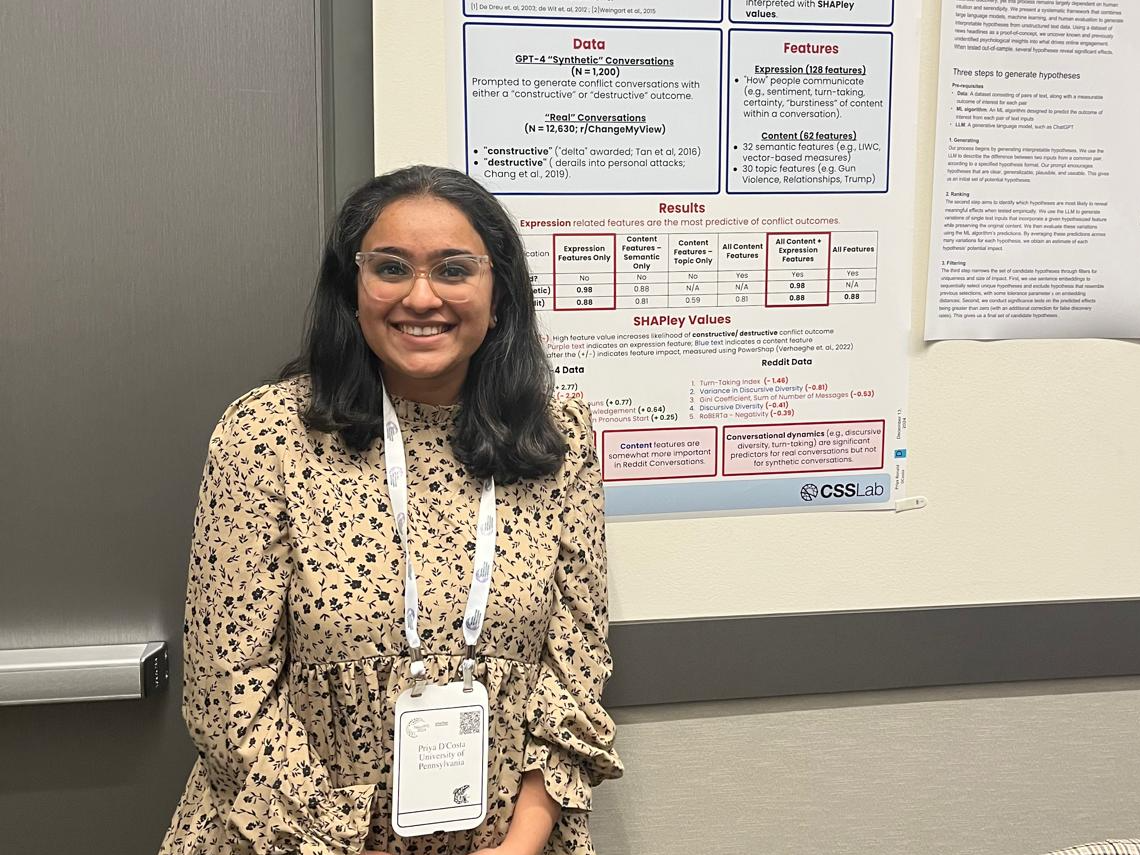
This past weekend CSSLab alumna Priya DCosta presented a poster titled What do you say or how do you say it? at the NeurIPS 2024 Behavioral ML Workshop. This was a first-time workshop on exploring the incorporation of insights from the behavioral sciences into AI models/systems in Vancouver on December 10-15. In this RA spotlight, Priya shares more on her background and research leading up to NeurIPS.
What is your background and what motivated you to join the CSSLab?
I am originally from Mumbai, India. I majored in Finance, earned my Chartered Accountancy (Indian CPA) license, and then spent five years working in finance. My job required me to work along with many tech teams, where I felt a huge void in my skills and decided to pivot to computer science.
I got into the Masters in Computer and Information Technology program at Penn, which is a Masters program specifically for people without a Computer Science undergrad degree. At that time I barely knew how to code, and wanted to work on a high-impact project to learn as much as I could.
The Team Communication Toolkit project (Led by Emily Hu) was just starting out at the CSSLab, and it was the perfect opportunity as the project needed someone to help with literature review using spreadsheets (my finance background was very handy!). Also, having worked with a variety of teams during my finance career, I was very curious to understand the science of teamwork from a research perspective.
Can you talk more about your research at the CSSLab and any breakthroughs you experienced?
I began my time at the CSSLab on the Team Communication Toolkit project, initially organizing literature on team communication. As I developed my coding skills, I coded up features to contribute to the toolkit – which is now an open-source tool available for researchers to use! By Summer 2023, I had grown to love research a lot, and wanted to pursue an Honors Thesis.
After a lot of brainstorming, Emily and I narrowed down on using the Team Communication Toolkit to computationally study an extremely pervasive real-life phenomenon – Conflict. We analyzed 191 communication features in 1,200 GPT-4-simulated conversations and 12,630 Reddit discussions, discovering that expression features, such as tone and turn-taking, are stronger predictors of destructive outcomes than the content of disagreements.
We observed that while conversational dynamics (how frequently individuals took turns while speaking, the diversity of the content being discussed etc.) were key predictors of conflict outcomes in Reddit discussions, they were less predictive in AI simulations, highlighting the limits of language models in mimicking human interactions. This is a small, but important step towards reconciling two long standing theoretical approaches to conflict: is the primary driver of conflict what people say, or how people say it?
What was your experience presenting at the NeurIPS Behavioral ML Conference Workshop?
NeurIPS 2024 was a reminder of how far I have come in two years – from barely knowing how to code to presenting at a top Machine Learning conference! My work was well received at the Behavioral ML workshop, with many folks asking intriguing questions as well as offering feedback that could grow this project. It felt happy to see my hard work reach fruition.
Any advice for students starting out their research career?
In the beginning, research can be extremely overwhelming – remember you are not alone. If I could give one piece of advice – it is to regularly seek and implement feedback, and iterate, iterate and iterate! You’ll eventually see the fruit of your hardwork in the most unexpected ways!
AUTHORS
DELPHINE GARDINER

–
Communications Specialist
